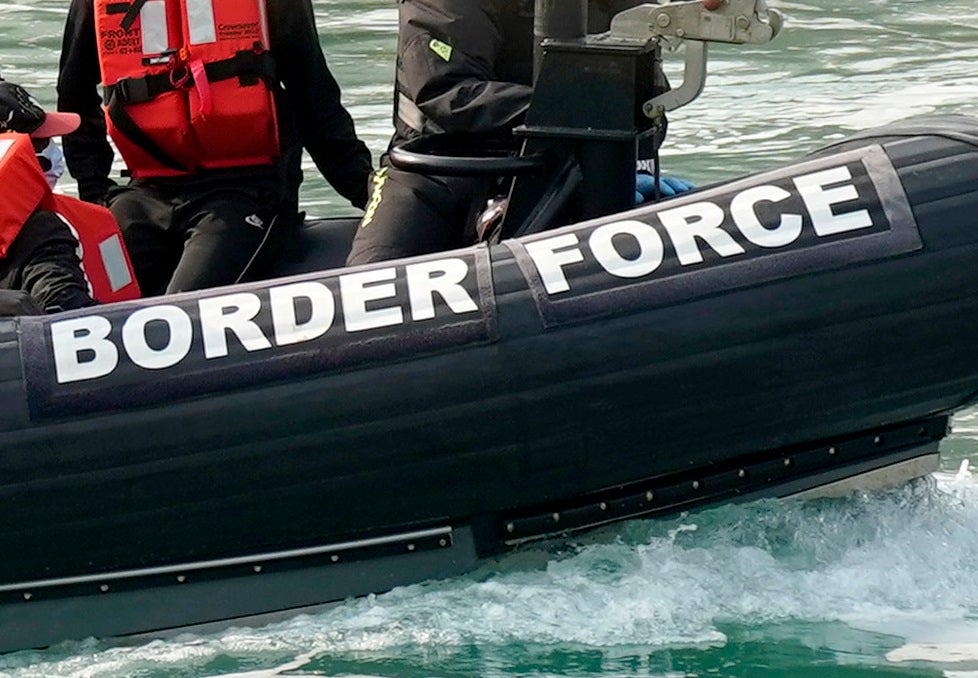Priti Patel says she wants to force migrant boats back to France ‘to save lives’
‘None of this is illegal,’ home secretary says days after warning from UN Refugee Agency

Priti Patel has said she wants to force boats carrying asylum seekers back to France to “save lives”.
The home secretary insisted that planned operations by the Border Force in the English Channel would not risk lives and cause people to drown.
During an evidence session held by the Lords Justice and Home Affairs Committee, she said there had been “extensive work” on legal and practical issues around push-backs.
Labour peer Baroness Chakrabarti, the former director of Liberty, said many people found the plans “shocking” and asked if the government had considered that it might be violating human rights and maritime law.
“You’ve got to be really careful not to [affect] some people who are genuine refugees, and frankly not to drown people, whether they’re genuine refugees or not,” she added.
Ms Patel said the government would “never do anything to put the safety of people’s lives at risk”.
“We don’t want to see people dying at sea and I’m very vocal about this, but at the same time I’m unapologetic about our determination as a government to stop the people trafficking and putting people in boats,” she added.
“We’re not here to threaten lives, we’re here to save lives and make sure that people’s lives are not put at risk.”
Ms Patel said several people had already drowned in the Channel, including a migrant who was reported to have fallen off a dinghy off the coast of Essex on Tuesday.
The home secretary told the committee that a legal framework had been created for push-backs and operational decisions would be made by Border Force, adding: “None of this is illegal.”
Ms Patel said that decisions on push-backs would take the weather and conditions into account, and would be done “in a safe way”.
“Our policy is based around saving lives and stopping people from drowning,” she added.

The home secretary was speaking days after a UN Refugee Agency (UNHCR) official said push-backs in the English Channel would “unavoidably” put lives at risk and may not work as a deterrent.
Speaking to the Joint Committee on Human Rights on 20 October, the UNHCR’s UK representative Rossella Pagliuchi-Lor said: “There is an obligation to both save lives at sea and not endanger lives at sea, which would almost unavoidably happen if there were attempts at turning back dinghies which are overcrowded with people.”
She warned that refugees forced back to France could “fall through the cracks” and be barred from its asylum seeker, adding: “There is a real risk that the right to seek asylum is eliminated by the fact that no country will take responsibility.”
Asked if push-backs would meet the government’s stated aims of deterring Channel crossings and tackle people smuggling, Ms Pagliuchi-Lor replied: “Frankly I don’t think so, we have to see but I really do not think this is going to have a significant impact.”
She questioned how many boats could effectively be pushed back when crossings are happening along a “very long stretch of coast”, and urged the UK to focus on effective processing and replacing returns agreements with EU countries that were lost in Brexit.
A Home Office impact assessment of the Nationality and Borders Bill, which contains the government’s plans for the Channel and wider asylum changes, said focusing on small boats could encourage “riskier means of entering the UK”.
Responding to government claims that its plans will deter dangerous sea crossings, the document said “evidence supporting the effectiveness of this approach is limited”.
The government has changed its Immigration Rules to mean that it can declare asylum applications from people who have travelled through EU member states on their way to Britain “inadmissible”.
But the UK lost access to an EU-wide returns agreement allowing asylum seekers to be transferred back to countries including France, Italy and Spain, in Brexit.
The home secretary admitted that only two returns agreements had been struck by Wednesday, with India and Albania, and several EU countries have told The Independent that bilateral negotiations are not underway.
She confirmed that the government was threatening visa sanctions against “countries that do not cooperate” on accepting returnees.
Ms Patel said the government would support asylum seekers arriving in the “right and proper way”, on regular routes and with documentation.
But the former Labour home secretary Lord Blunkett pointed out that persecuted people may not have passports, visas or formal permission to leave the country they are fleeing.
“I get the impression that if you are properly documented and you have been able to come legally you will not be granted asylum because you are clearly not at risk, whereas if you are at risk and escaped without documentation, you will be inadmissible,” he added.
Join our commenting forum
Join thought-provoking conversations, follow other Independent readers and see their replies
Comments

Bookmark popover
Removed from bookmarks